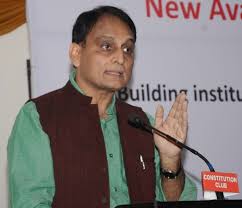
Uri’s grim story has hurt 130 crore people of India and the country collectively realised that days of dialogue and diplomacy with Pakistan are over. The RSS, Jan Sangh and later the BJP have never been unambiguous in their reading of Pakistan. Its very creation was based on the narrative of deconstruction of democracy, secularism, and indivisible civilisational history of India. Therefore, its primary source of existence has been perennial hatred for India. Rulers and generations of Pakistan have changed but their collective conscience against India remains unchanged.
The formation of the BJP-led NDA government in 2014 was a message of “Akhand Bharat”. The Pandavas, before entering the final battle of Mahabharata, made one last attempt to buy peace and demanded only five villages from the Kauravas but the latter refused. Prime Minister Narendra Modi made the most sincere effort to convince Pakistan that mutual trust and dialogue was the path for resolving disputes. Pakistan, however, responded with terrorism that exposed it. The world has acknowledged the genuineness of Mr Modi’s preventive diplomacy.
A New York Times editorial on May 12, 2016, urged the US government “to put the squeeze on Pakistan” for its double game dealing with Afghanistan. However, the US can’t escape from its own responsibility for milking Pakistan’s tryst with terrorism.
In Pakistan, there has never been any pro-peace or pro-India sentiment. There is division of labour between Army, jihadis, politicians and press. They collectively disown terrorist actions emanating from their land be it 26/11 Mumbai terror attacks, Pathankot or now Uri. The reaction of Pakistani so-called liberal English press on Uri incident grimly unravel that they are legitimising tools of terrorism.
While Uri is a lesson for war-like alertness even during peacetime, it also finally resurrected our original perspective that it is institutionalisation of jihad masked by nationality. As democracies largely don’t engage in war, a democratic-secular state can’t expect constructive dialogue and critical solution from a theocratic and rouge state. Sooner we realise our moral and military responsibility to undo the idea of Pakistan it would be precursor for peace in the region. There is no iota of doubt that every Pakistani terrorist considers his “sacrifice” as a service to the idea of Pakistan and Islam and none in Pakistan disavow them. Therefore, those who disclaim idea of disintegration of Pakistan as hawkish are, ipso facto, still guided by Nehruvian policy of mendicancy to buy peace.
Sometimes peace is born only from the barrels of guns. It was vindicated in 1971 and now time is ripe to change the map of the region. There is no demand in Pakistan for dialogue with India but there are some like CPI(M) and a microscopic but powerful lovers of Pakistan scattered from academia to art gallery and media, who beat their chests not for unprovoked attacks by Pakistanis but for dialogue with unprovoked aggressors.
Moreover, when the country has been facing the difficult choice to deal with a state which is a bunker of terrorists armed with nuclear arsenal, the Congress is engaged in taking political revenge with BJP and Mr Modi for its humiliating defeat in the last elections. The mandate of the people of India is to deal firmly be it the separatists in the Kashmir Valley or Pakistan.
By Rakesh Sinha,
chief editor of Pakistan Watch and honorary director of India Policy Foundation
Courtesy: Deccan Chronicle














